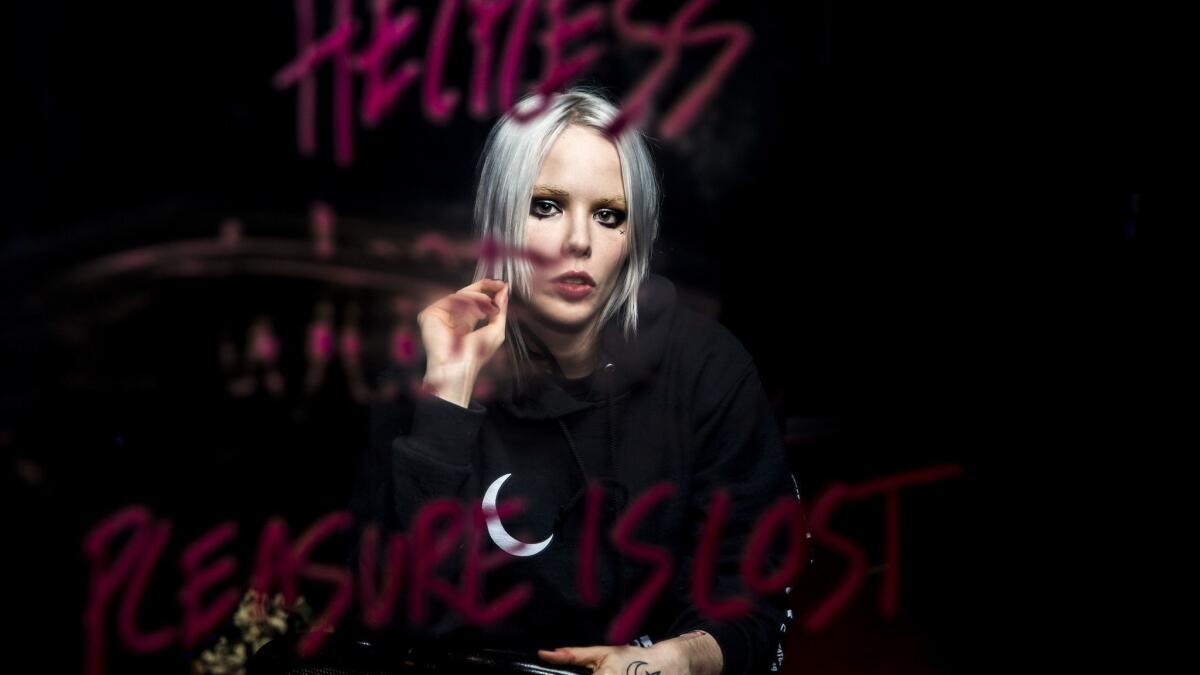Review: Alice Glass and Zola Jesus provide a soundtrack to the #MeToo era

“This is a song for my uncle who attempted suicide,” said Nika Danilova on Thursday night. Danilova, who performs as Zola Jesus, was co-headlining the Teragram Ballroom with her like-minded peer Alice Glass. She was about to play “Witness,” a centerpiece of her dark, wounded album “Okovi.”
Then a man up front shouted at her.
“Show us your tits!”
The audience groaned. Really? You yell that at a showcase for two female artists writing about death, assault and pain?
“I will never show you my tits. Ever,” Danilova replied, to cheers. Then she played on. The guy was lucky to not have been frogmarched out by the scruff of his neck.
For anyone wondering if men in music have felt chastened and reflective in the #MeToo era, there’s your answer. Sadly, there’s still so, so much work to be done.
Fortunately, both Glass and Zola Jesus are doing it, on records that both document and inhabit the rage and confusion of this moment.
Glass, who closed out on Thursday, has a particularly searing story to tell. The former Crystal Castles singer left her band under dark auspices, claiming years of abuse from her then-band mate. Her new music, which draws from trap, K-Pop and electro-punk, is brighter and catchier than that group’s gothic raves. It also directly confronts abuse in ways that are both unsettling, redemptive and absolutely necessary.
The two singers’ co-headlining tour (with an opening set from Pictureplane, the ambitious avant-garde electronic project from the New York producer Travis Egedy) was a particularly bold and current booking.
So many artists and industry professionals have given support and momentum to the movement against assault and disparities for women, in entertainment and elsewhere. But Glass and Zola Jesus’ music lives in that anger, the feeling that rises up when the true, ugly face of inequity and vulnerability shows itself.
As it turns out, you’re not even safe onstage at your own show.
The songs from “Okovi” had a particular edge on Thursday. Danilova, flanked by a violinist and multi-instrumentalist, tucked deep into brooding menace, broken only by her clear and powerful vocals (now well honed from a decade of work in savage experimental music and more commercial pop). “Bound,” a harsh but captivating new techno-driven single, showed that she’s ready to keep this fight alive.
Glass, by contrast, has been fighting for years to even get back to the stage. Her personal and legal battles with her former Crystal Castles band mate and boyfriend had consumed much of her public life for the last few years. The open letter detailing her allegations was a harrowing document of essentially a whole career fraught with coercion and pain.
How does one make music in the wake of that, and both confront abuse while moving past it?
She found a capable production partner in former Health guitarist Jupiter Keyes, and together the tracks off her debut solo EP pointed at a brighter, if still heavy and emotionally furious, new direction.
On Thursday, Glass traded some of her prowling, live-wire stage presence for a new way of living onstage. Her vocals are now run through with effects that lend a pitched-up sheen to tracks like “Without Love.” Her voice had a clarity that still felt purposefully uncanny and antagonistic. It was almost a digital suit of armor as she prepared to go out and do battle.
But she also looked happier than she had in a long time — bounding across the stage with an almost teenage enthusiasm, even as she sang some truly cutting lyrics. “Natural Selection” in particular made the most basic plea for dignity and autonomy: “Get the …off of me. Get out of me.”
She even started to take back some of her old band’s songs, playing the single “Celestica” as a kind of reclamation of her own past. It’s a radical act to say that even a band she shared with her alleged abuser still made work of value to her, and she has every right to take from that what she needs. It was her life too.
For whatever success, confusion or ambitions she has at this moment, that’s something no man can take away from her.
For breaking music news, follow @augustbrown on Twitter.
More to Read
The biggest entertainment stories
Get our big stories about Hollywood, film, television, music, arts, culture and more right in your inbox as soon as they publish.
You may occasionally receive promotional content from the Los Angeles Times.











